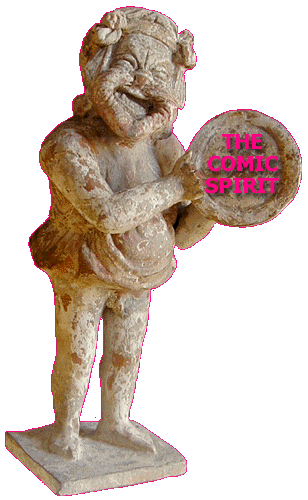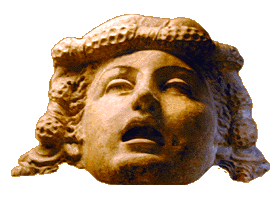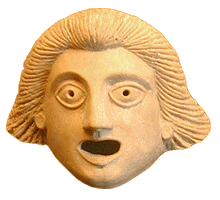CLS 173 CDA The Comic Spirit
| Dr. Ann R. Raia |
Spring, 2000 |
| E-mail: araia@cnr.edu |
Web Home page |
| Office: Castle 325 |
Phone: ext.5398 |
| Office Hours: M 3:30-4:30, Tu 2-3, Th 2:30-3:30, and by appointment |
Fax: (914)-654-5259 |

Syllabus
Description:
This course offers multiple experiences of comedy toward an exploration
of the nature, form, and function of comedy. Reading and analysis of
selected comic plays by Aristophanes, Menander, Plautus, and Terence will
illustrate themes, techniques, and conventions of comedy which may be
still found in modern comedy. In search of a definition of comedy, comic
criticism from Aristotle to Freud will be measured against reading,
performance, and experience.
Course Objectives and Learning Outcomes:
- increased knowledge of the cultures of Greece and Rome:
- appreciation of their contributions to the genre of comedy
- insight into the society as reflected in comedy (particularly
issues of class and gender)
- familiarity with the forms and conventions of Greek and Roman
comedy and their impact on individual creativity
- understanding of comedy, performance and literary, as a distinctive
form of aesthetic expression
- ability to analyze, evaluate, and compare the individual comic styles
and themes of Aristophanes, Menander, Plautus, and Terence
- awareness of the universal dimensions of comedy through reading comic
theory and comparison of ancient and modern comedy
- development of the imagination through comic performance
Methods of Instruction:
- Discussion in class and on the Internet of assigned plays, essays,
and student texts
- Slide presentations and lecture on the origins and development of
Greek and Roman comedy, the ancient theater, and dramatic conventions
- Critical viewing and performance of ancient and modern comedy
- Writing projects, reports, computer workshops
Materials of Instruction:
- For this class, using a 3-ring binder with pocket folders
will make it possible for you to stay organized (class notes, hand-outs,
and graded assignments that must be kept for submission in your Comedy
Portfolio).
- Purchase the following required texts in paperback at the bookstore (
in order for us all to be “on the same page” during class
discussion, it is preferable that you use these editions):
- Aristophanes. Four Plays: Clouds, Birds, Lysistrata, Frogs,
translated by William Arrowsmith (New American Library)
- Menander. Plays and Fragments, translated by Norma Miller
(Penguin)
- Plautus. Four Comedies: Braggart Soldier, Menaechmi, Haunted
House, Pot of Gold, translated by Erich Segal (Oxford)
- Terence. The Comedies, translated by Betty Radice (Penguin)
- Xeroxed materials (visuals, essays, articles, outlines, and reading
guides), videos, slides
- Our class has its own on-line “Studio” for electronic
discussion, in Washington State University’s
“Speakeasy Studio &
Cafe” in The CNR Neighborhood. Each student will be enrolled
as a member and be able to log on.
Requirements: Students are expected to--
- attend all classes and workshops with their course materials,
arriving promptly and remaining until the end of class. Anyone with more
than four unexcused absences will fail the course. Those who are absent
are responsible for obtaining assignments, notes, and materials
- read and reflect critically on assigned texts and contribute
thoughtfully to discussions
- submit assignments on time (late work will receive a lowered grade)
and in full: oral presentations must meet guidelines; written work must
respond to instructions and conform to standards for formal writing (see
your writing manual or the CNR Student Handbook), be typed,
word-processed, or handwritten clearly
- take 3 quizzes
- collaborate cooperatively on a group performance project
- attend 3 special events: a film showing of “Funny Thing
Happened on the Way to the Forum”; Mardi
Gras in costume; an approved live dramatic performance. I am
organizing a group trip to “The
Bomb-itty of Errors”, a hip-hop take-off on Shakespeare’s
“Comedy of Errors” in lower Manhattan. Another possibility is
Broadway’s “Kiss Me Kate” (expensive!)
- submit a Comedy Portfolio: your collection of comic materials
(visuals, essays, articles, etc.), the semester’s graded comedy
assignments (a checklist will be supplied), and your reflections on
ancient and modern comedy
Grading:
Your grade will be based on the quality of your completed work as
follows:
Class participation and assignments 30%
Quizzes (3) 30%
Group research and performance 30%
Comedy Portfolio 10%
Those who do not complete all requirements will receive an F grade for
the course
| Schedule of Semester Topics |
| The class meets in Chidwick 203 on Tuesdays &
Thursdays from 11 a.m. to 12:15 |
| More detailed assignments will be posted daily on
the blackboard |
January 25: Distribution and Review of the Syllabus
January 27- February 8: Orientation to the Topic, the Questions, the
Course Methods:
Reflecting on and sampling the wide range of comedy in contemporary
culture and your own experience of comedy, we will attempt to answer such
questions as:
Why do we laugh? What do we laugh at? Does laughter define comedy?
Have you got a sense of humor? Are you a creator or consumer of comedy? Is
comedy universal and timeless or culture-gender-experience-specific? Where
did comedy originate? What does comedy tell us about the culture from
which it arises? What is comedy’s function? What is its relation to
tragedy? Does comedy happen or is it constructed? Who are the people of
comedy? What is the dress of comedy? What are the actions of comedy? Does
comedy have its own language and methods? Where and when does comedy take
place?
February 1 and 8: Computer Classroom (CC 314), Workshops # 1
and # 2
Handouts of essays and visuals; clips from videos of modern comedies
February 10-March 2: Domestic Comedy: The Family and Romance
- Family: The Brothers Menaechmus (Plautus), The
Mother-in-Law (Terence),
The
Girl from Samos (Menander)
- Romance: The Girl from Andros (Terence), The Eunuch
(Terence)
February 15: Computer Classroom (CC 314), Workshop # 3
March 2: Quiz 1
Handouts of essays and guides, slide-lecture, trip to a live performance
of “A Bomb-itty of Errors”
March 7-23: Comic Heroes
- Lysistrata (Aristophanes), The Haunted House
(Plautus), Phormio (Terence)
March 7: Computer Classroom (CC 314) Workshop
March 23: Quiz 2
Handouts of essays and guides, slide-lecture, video: “A Funny
Thing Happened on the Way to the Forum”
March 28- April 27: Comic Satire and Parody
March 28, April 11, April 25: Computer Classroom Workshops (CC 314)
March 28 Evening: Mardi Gras
April 27: Quiz 3
Handouts of essays, slide-lecture, reading guides, video excerpts: “Miles
Gloriosus”
May 2-11: Group Performances Closing Conversations
Group presentations and performances of ancient comedies
Comedy Portfolios due on the first day of exams



